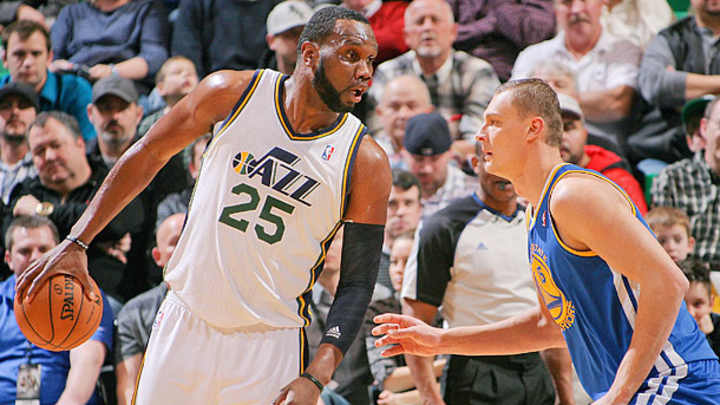Deadline wrap: Jazz, Kings confound

Al Jefferson (left) is set to become a free agent after the season. (Melissa Majchrzak/NBAE via Getty Images)

By Rob Mahoney
Four thoughts on what did and didn't happen at the NBA trade deadline:
• Atlanta's choice to retain Josh Smith might be the biggest story of the deadline, but Utah's decision to keep both of its soon-to-be free-agent frontcourt starters is by far the bigger transgression.
Power forward Paul Millsap and center Al Jefferson work together reasonably well, but only well enough for Utah -- which has positioned itself for a likely (and doomed) playoff berth -- to vaguely justify standing pat. Jazz general manager Dennis Lindsey can't reasonably consider bringing back both players on new deals to reenact the same middling performance, lest the team continue to slow the development of Derrick Favors and Enes Kanter due to its veteran-heavy bent. Like it or not, those two prospects both figure to play prominent roles in the Jazz's future, a new era that could have been facilitated by clearing up the logjam now. Doing so wouldn't just clean the slate, but also add supplementary assets to a roster that's very much incomplete. Jefferson would have been valuable to another playoff team. The same goes for Millsap, albeit with the caveat that he'd be the more sensible player for Utah to re-sign for the long term.
In fairness to Lindsey, we'll likely never know the details of deals the Jazz may have declined, and Utah has the flexibility to still try for a sign-and-trade this summer. But this was Utah's last best shot at dealing from a position with leverage, and yet the Jazz came away from the deadline empty-handed.
• Even after having some time to dwell on the Kings' decision to trade No. 5 pick Thomas Robinson to the Rockets for scraps, I'm struggling to find even the most outlandish justification for it. I get that finances played a part, as things do for all NBA teams and especially for the Maloof-run Kings, who are set to be sold. But this doesn't amount to much of a salary dump: In addition to receiving $1 million from Houston in the six-player trade, the Kings are saving only about $1.2 million in salary for the rest of the season.
Beyond that, where is the benefit for the Kings? Francisco Garcia and Tyler Honeycutt, the other two players who were dealt to Houston, have team options for next seasons that Sacramento could have declined. Patrick Patterson, solid though he may be as the main piece coming from Houston, has both a lower ceiling as a player and two fewer years remaining on his rookie contract than Robinson. Over a four-season stretch, it's very easy to see the Kings actually adding salary through this deal, as Patterson's restricted free agency in 2014 could well force them to overpay to retain him. It's a mess of a move from top to bottom, in which Sacramento surrendered the most valuable piece (and potentially, best player) without shedding any lengthier contract (I'm looking at you, John Salmons) for the sake of some shameless savings and an unexceptional big man.
• The Bucks acquired the best player moved at the deadline in J.J. Redick, but in trading for him they sold out -- and sold low -- on two pretty solid prospects in second-year forward Tobias Harris and rookie guard Doron Lamb.
Harris, 20, had a decent start to his sophomore season, but he fell out of Scott Skiles' good graces and proceeded to rack up DNP-CDs under interim coach Jim Boylan. Some of that resulted from Milwaukee's veteran depth at forward, but Harris can still help a team and should go on to have a successful career. Harris may not have any go-to NBA skill yet, but he has a knack for the timing and flow of the game that allows him to get opportunistic baskets and show flashes of defensive aptitude. His game is a bit plain, but Harris is further along the learning curve than many projected he might be at this point in his career.
Lamb isn't quite as viable in the present, but his scoring potential and respectable on-ball defense make him a decent prospect on a bargain of a deal. The Magic will now have this season and the ensuing two (if they so choose; the last year of Lamb's deal isn't guaranteed) to gauge and develop Lamb as they see fit, all while paying him a total of just $2.4 million for those three seasons.
Orlando GM Rob Hennigan may not have scored the first-round pick that he desired in a deal for Redick, but he did well in adding an interesting pair to the Magic's growing core of prospects.
• A few deals managed to trickle in right at the deadline buzzer, including two cost-cutting measures designed to get the Warriors under the luxury tax line. In one move, the Warriors shipped project big man Jeremy Tyler to the Hawks for a second-round pick. In another, Golden State sent seldom-used point guard Charles Jenkins to Philadelphia for another second-round pick. Both trades make sense, given how close the Warriors were to the tax line and how dispensable the two players were in the context of the current roster.
Royal Ivey
